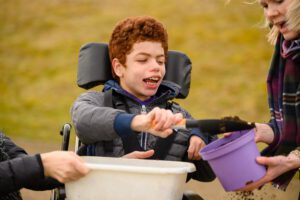Pathway 1
Pathway 1- An informal curriculum
Curriculum Intent
To provide a rich curriculum which uses sensory exploration to engage students with the world around them. The curriculum will maximise communication, creativity, specific interests, and life skills. It will support and maintain physical wellbeing by providing the resources and support necessary to meet individual needs. Students following Pathway 1 will be supported to take their place as happy and fulfilled members of the wider school community.
Implementation
The curriculum for pupils with PMLD reflects the cross curricular and multidisciplinary nature of the sessions we deliver. The curriculum is divided into four strands within which all of our sessions are embedded. The four strands then collectively enable our students to develop cognition and learning skills, improving their long-term memory and growth as individuals.
Pathway 1 Curriculum Strands
- Communication & Independence
- Communication & Interaction
- Creativity and Exploration
- Physical Well-Being
We have an interactive, consistent, and repetitive approach to teaching and learning. This is reflected in the timetable which incorporates the use of daily cues, sensology, intensive interaction and personalised communication support.
Highly structured, tailored class programmes are provided by an integrated team of teachers, therapists, and teaching assistants. The focus is very much a ‘needs’ led programme with an emphasis on multi-sensory approaches and experiences. Tasks are structured carefully so that they are relevant and purposeful for each student to maximise motivation and engagement.
The complexity of our Pathway 1 learners highlights the need for a high level of therapeutic input. The Speech and Language Therapy team and communication HLTA’S provide input in relation to alternate communication methods such as switch access, eye gaze, use of photographs, symbols, signs and sensory cues. Physiotherapy and Occupational Therapy teams work together with teachers to deliver programmes that can be utilised in class or during individual 1-1 focused sessions in our well-being centre. Our physical and well-being programme is developed alongside the therapists to always maximise purposeful movement and promote good health. Students enjoy access to the hydrotherapy pool and rebound therapy as part of the focus rota. Collectively staff utilise the MATP programme to enable our students to be as independent as possible.
Due to the complex needs of our pupils we ensure that what we teach is fit for purpose. Therefore, all teaching must be meaningful to the needs of our PMLD pupils with curriculum content carefully selected in order to provide relevance, coherence and breadth and is delivered at a suitable and appropriate pace. Needs led multi-sensory teaching and learning is utilised throughout which aims to provide a wealth of varied sensory experiences for our pupils within an active learning environment thus enabling them to:
- Use their initiative and be motivated to reach out
- Develop preferences and persistence skills to show choice
- Develop anticipatory skills
- Develop early ‘ready to learn’ concepts e.g. object permanence
- Begin to gain an early awareness of conceptual elements
- Develop tactual skills – as hearing and vision may be fragmented for our pupils tactual learning can be used as a connecting strategy.
A long-term plan with diverse thematic topics is in place for Phases 1 and 2. There is a two- or three-year rolling programme depending upon phase. It has been devised specifically for the PMLD cohort and runs in parallel to the semi formal English curriculum. This is complimented by age-appropriate subject specific sessions. These include Citizenship, Sensory Cookery, Enrichment, Nurture and Well-being, Outdoor Learning and Music interaction (Further details in the School Curriculum Statement ). The rolling programme provides teachers with a framework for planning what is to be taught within their class group. An element of flexibility exists whereby what is taught can be modified to meet the individual needs of the students. This may include covering a specific topic but differentiating the topic content and the pace in which it is delivered in order that it is appropriate for individual students.
Our aspiration is that a thematic approach to learning will enable Pathway 1 students to have multiple opportunities to engage in learning. Students will build new skills and maintain and develop knowledge across the timetable. These small steps are monitored and assessed utilising MAPP and the Engagement Model. Teachers record evidence of this learning and progression utilising ‘Evidence for Learning’ which is then shared with parents and carers.
Each year Pathway 1 teaching and learning is promoted and celebrated during
‘Discovery Week’
- Discovery Week encompasses an opportunity for students in all three pathways to engage in active learning activities. Students engage and learn new creative, thinking and social skills whilst working collaboratively. All learning opportunities embed the 5 engagement areas and encourage cross curricular understanding and mental well-being.
-
- Exploration
- Realisation
- Initiation
- Anticipation
- Persistence
Pathway 1 Focus Rota
| Year groups | Autumn | Spring | Summer | |
| Year 7-8 |
Year 1 |
Roald Dahl |
Yesterday, Today and Tomorrow |
Me and My World |
|
Year 2 |
Lights, Camera Action.
|
Heroes and Villains
|
Adventures and Great outdoors |
|
| Year 9-11 |
Year 1 |
Magic
|
Space – To Infinity and Beyond |
Under the sea |
|
Year 2 |
Spooky & Sparkle |
Animals
|
Happy holidays & Going Global |
|
|
Year 3
|
Musicals |
Prehistoric World |
Mysteries and Crime |
|
Primary ICT Support Copyright © 2025 Talbot Specialist School
All Rights Reserved

